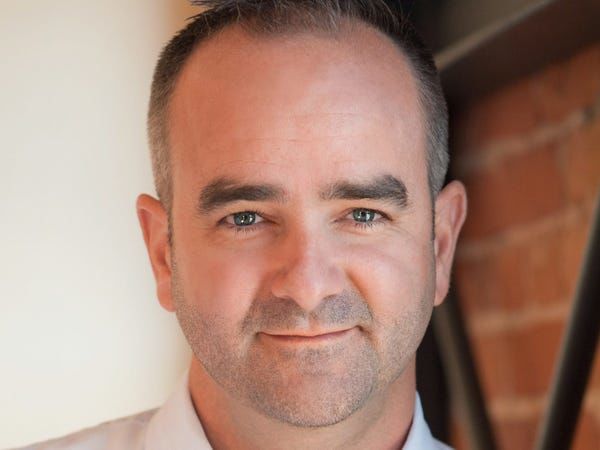AppLovin, Vungle, and Digital Turbine have all made big bets on mobile adtech this year.
The mobile app and gaming space is red-hot with acquisitions and deals, sparking a whirl of chatter about the companies that could be acquired next.
Apple's upcoming privacy changes are expected to significantly limit how mobile ads are targeted and measured, which has led to a rush in deals in recent months as companies seek to build out their own mobile advertising and measurement capabilities in-house. The resurgence in adtech stocks, an uptick in M&A, and growth in time spent with phones and gaming apps during the pandemic are also prompting the flurry.
"There's a general frothiness related to privacy and covid," said Eric Seufert, an analyst and author of Mobile Dev Memo.
Mobile gaming giant AppLovin plans to go public next week in a initial public offering that could value the company at $30 billion. AppLovin recently acquired mobile measurement firm Adjust for a reported $1 billion. Elsewhere, mobile ad firm IronSource plans to go public via a SPAC that is valued at $11.1 billion. And Blackstone-backed Vungle bought GameRefinery and Algolift within six months of each other.
Publicly traded mobile media company Digital Turbine has been on an acquisition spree this year — acquiring mobile ad firms AdColony, Triapodi, and Fyber between February and March. Digital Turbine works with mobile carriers to pre-install apps on phones and sells ads within some of the apps.
"There are a handful of companies that have started to develop their own ecosystems — I would argue that Digital Turbine is one of them," said Matt Tubergen, executive vice president of corporate development at Digital Turbine. "We saw a big opportunity to do an ecosystem play similar to that of Apple and Google but around carriers."
Companies are also likely to rush deals through ahead of Apple's rolling out its App Tracking Transparency (or ATT) feature, Seufert said. He said he expects for the valuations of some mobile companies to get cut by 25% once Apple's feature is rolled out. Apple's privacy update is expected to come into effect any time in the coming days and weeks.
Jeff Coon, managing director at investment firm Progress Partners, said that he expects to see a high level of M&A activity in mobile ad platforms and contextual advertising companies that don't rely on third-party cookies to target ads.
Insider spoke with nine investors, executives, and experts to identify mobile advertising and analytics companies could be acquisition targets. The group of seven companies, listed below in alphabetical order, is speculative and not all of these companies are discussing deals.
Where we can, we have noted each company's funding to date.
Adikteev
 Adikteev CEO Xavier Mariani.
Adikteev CEO Xavier Mariani.
Total funding: $14.2 million, according to Crunchbase
Adikteev is a French startup that focuses on retargeting — a technique where advertisers direct ads at people who have already visited their website or viewed their products. The company also helps publishers keep people using their apps and reduce churn, two of the biggest problems for mobile developers.
Publishers use Adikteev's tech to buy ads that target people who have left an app encouraging them to re-open an app and track metrics like the lifetime value of a user. Its clients include Amazon, TikTok, and Yelp.
Andrew Daniel, managing director at investment firm Digital Capital Advisors, signaled out Adikteev as a retargeting company that could be acquired. He said that Apple's changes will make retargeting harder, leading to a wave of consolidation that will limit the number of retargeting companies to a handful of firms.
Adikteev CEO Xavier Mariani said that the firm has been approached by a couple of buyers in recent months but is not looking for an acquirer.
In a post IDFA world, user retention is more strategic than ever, and the industry will look for solutions that will help be smarter in user acquisition [and] retain audiences among titles," he said.
Braze

Total funding: $175 million, according to Crunchbase
Without third-party cookies, privacy changes put more pressure on brands to collect first-party data like email through things like loyalty programs, and text-messaging programs that advertisers can use to target ads and messages.
Braze is one of a handful of big mobile marketing firms that sells software that organizes first-party data so that advertisers can coordinate and plan personalized mobile messages across apps, text messaging, and mobile messaging. Braze's revenue comes from subscriptions. Its subscription revenue increased 60% year-over-year during the first nine months of 2020, according to the company. In 2019, Braze hit more than $100 million in revenue.
Braze competes with large marketing tech firms like Adobe and Salesforce and has data-sharing and marketing automation deals with cloud giants Snowflake and Amazon Web Services.
Elgin Thompson, managing director of technology investment banking at JMP Securities, said that Braze's focus on first-party data puts the company in a better position to accommodate Apple's changes than other mobile ad firms.
"Folks like Braze are leaning towards an omnichannel solution because [people aren't] just using phones to make transactions — being able to coordinate and automate messages in a timely fashion is the big opportunity for brands today," he said.
Braze declined to comment.
Chartboost
 Chartboost CEO Rich Izzo.
Chartboost CEO Rich Izzo.
Total funding: $21 million, according to Crunchbase
Chartboost's technology helps app publishers create ad auctions where advertisers bid on prices to win ad slots. Chartboost's tools also help advertisers target specific audiences across apps. The company competes with the likes of Google, AdColony, and Unity Ads.
Apple's privacy changes will require users to opt-in to share data that's used to target ads, and Chartboost is part of a group called No IDFA No Problem that provides resources aimed at addressing concerns from mobile marketers and developers. "IDFA" refers to Apple's Identifier for Advertisers. The group is comprised of companies like Chartboost, Liftoff, Singular, and InMobi.
Two sources noted Chartboost as a potential target acquisition because of its sole focus as a mobile ad network. Its investors include Sequoia Capital and TransLink Capital.
Chartboost did not respond to a request for comment.
InMobi
 InMobi CEO Naveen Tewari.
InMobi CEO Naveen Tewari.
Total funding: $320.6 million, according to Crunchbase
InMobi is one of a few longtime mobile ad networks. It helps publishers sell ads on sites and apps, particularly mobile games, and it has more recently moved into video streaming. The company also sells a demand-side platform that advertisers use to buy mobile ads and a marketing cloud aimed at helping marketers analyze insights for campaigns.
The firm is India's first unicorn company backed by venture capital and is reportedly also eyeing an IPO that could value the firm at $15 billion, Bloomberg reported.
Progress Partners' Coon, said that while InMobi is rumored to go public, the firm is also an acquisition target itself because of its global business.
"They are at a large-enough scale that they could easily be a successful, publicly traded company but they're also a very attractive acquisition target as the dominant ad platform in APAC," Coon said.
InMobi declined to comment.
Kargo
 Kargo CEO Harry Kargman.
Kargo CEO Harry Kargman.
Kargo is an 18-year-old mobile ad network that sells custom-designed mobile ads for publishers like The Hollywood Reporter and Food Network. In recent years, the firm has moved into programmatic advertising. It has not raised any money and acquired social adtech firm Rhombus last year.
Matt Barash, SVP of global publishing and platform partnerships at Zeotap and a former exec at AdColony, speculated that Apple's changes could make Kargo an attractive acquisition target as marketers put more of a focus on testing messages that resonate with people.
Chris Cunningham, an investor and founder of C2 Ventures, said that Kargo's scale and lack of funding makes it an attractive acquisition target.
"They're one of the few remaining independent, scaled businesses," he said.
Kargo founder and CEO Harry Kargman said that the company's first-quarter 2021 revenue grew 45% year-over-year.
"Kargo has been focused on the intersection of creative and premium content to drive results for clients," he said. "With the decline of cookies and user-level targeting, we are seeing an urgency from brands to transition to this approach to advertising."
Kochava
 Kochava CEO Charles Manning.
Kochava CEO Charles Manning.
Kochava is a 10-year-old mobile measurement firm that originally specialized in measuring Facebook ads but has since expanded to measuring a wider swath of in-app ads.
The firm, which has not raised any money, helps advertisers measure metrics that track if someone bought a product after seeing an ad for it in apps, websites, and streaming TV platforms. Kochava also sells identity and consent management products that help marketers pull together mobile data or plug web links into ads that drive people to specific pages to buy products.
The firm also has a growth arm that helps advertisers keep people in apps and reduce churn. Kochava has acquired a few adtech companies, including buying data firm Thalamus, which helps advertisers and publishers match data.
Seufert said that Kochava is one of a handful of mobile ad firms that could be targets because of its access to granular measurements that will get harder for marketers to access with Apple's changes.
But he said that CEO Charles Manning's ownership of the company means that Kochava may not be looking for buyers.
Manning agreed that his backing of the firm means that Kochava isn't rushed for an acquisition.
"As a bootstrapped company, Kochava has flown under the radar of many corp dev teams who rely on venture published metrics — that doesn't appear to the the case any longer," Manning said. "Being forced to sell because of a financial partner is not part of our operating framework."
Tapjoy
 Tapjoy president and CEO Jeff Drobrick.
Tapjoy president and CEO Jeff Drobrick.
Total funding: $85.6 million, according to Crunchbase
Tapjoy was founded in 2007 and has long focused on powering ads within popular mobile games, created by developers like HeroCraft. Tapjoy's formats include full-page interstitial ads and native ads that offer in-game rewards to users who interact with the ads.
Several sources noted Tapjoy as a acquisition target for competing mobile gaming companies that are making big acquisitions, such as AppLovin or Vungle.
Digital Capital Advisors' Daniel noted that Tapjoy is smaller than its competitors and has gone through a restructuring aimed at growth.
Tapjoy president and CEO Jeff Drobrick said that Apple's upcoming privacy changes make it more important for developers to have third-party tools.
"The recent announcements give strong validation on the importance of software for monetization, user acquisition and analytics to help app developers realize growth," he said. "That's been Tapjoy's core focus for over a decade, and our approach has paid off: just last quarter we surpassed nearly 1.5 billion monthly active users."















